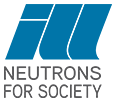The 27th edition of the Laboratory Course on Neutron Scattering, organised by the Jülich Centre for Neutron Science (JCNS), took place from 25 August to 5 September 2025. The 35 participants, selected from 240 applicants, were a very international group of highly motivated graduate students coming from institutions in 12 different countries. 38% of the participants were women.
This year, the two-week course was split between Forschungszentrum Jülich (FZJ), in Germany, and the ILL in Grenoble, France. The first week, held in Jülich, was devoted to lectures and exercises. The lectures provided an introduction to neutron scattering and instrumentation. Talks on application highlighted the crucial role of neutrons as probes in soft matter, energy materials, life sciences, quantum materials, as well as in industry.
The school then moved to the ILL for a week of hands-on training. Two additional lectures were also held at the ILL, on nuclear and particle physics, and on neutron imaging. Arriving shortly after the start of the second 2025 ILL reactor cycle, the participants benefitted from the ideal setting for hands-on training in fully realistic conditions.
The participants carried out experiments using 24 world-class instruments, out of ILL’s suite of over 40 instruments. A very broad set of instruments was presented to the participants, covering single crystal and powder dffraction, reflectometry, small-angle neutron scattering, backscattering spectroscopy, neutron spin echo spectrometry, triple-axis spectroscopy, time-of-flight spectrometry, spectrometry for high-energy dynamics, strain analysis, neutron and X-ray tomography, as well as fundamental neutron physics instrumentation.
In addition, seven scientific computing tutorials were conducted, highlighting the growing importance of computational methods in neutron scattering. These included a “virtual experiment” session.
The main organisers of the school were JCNS researchersMargarita Kruteva, Irina Apanasenko and Reiner Zorn. The collaboration and commitment of the local teams at the ILL were vital for making the week a success. Below, a small photo gallery of the event.













